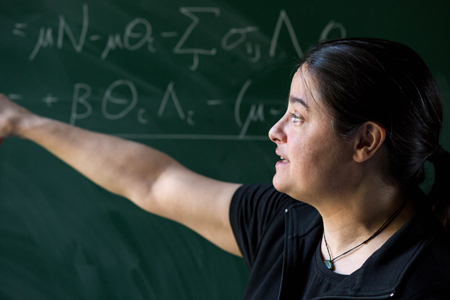
On the mathematical frontline: Julia Gog

Julia Gog. Photograph by Henry Kenyon.
Over the last year we have done a lot of reporting on the maths of the COVID-19 pandemic. Behind the maths there are of course people — those mathematicians who make the epidemiological models that do (and sometimes do not do not) inform government policy, who are grappling with the unprecedented challenge of coming to grips with a live pandemic unfolding in front of their eyes.
Our new podcast series, called On the mathematical frontline, is about those people. It explores the maths they do, how they go about it, and the impact it has on their personal lives.
The first person we speak to in this new series is Julia Gog, Professor of Mathematical Biology at the University of Cambridge, participant of SAGE and member of the epidemic modelling group SPI-M.
Gog is also a founding member of the JUNIPER modelling consortium we are collaborating with, and which you'll hear more about in the podcast.
So what is it like working on the mathematical frontline? Find out more with Julia Gog!
You can listen to the podcast using the player above, and you can listen and subscribe to our podcast through Apple Podcasts, Spotify and through most other podcast providers via podbean.
The podcast is part of our collaboration with JUNIPER, the Joint UNIversity Pandemic and Epidemic Response modelling consortium. JUNIPER comprises academics from the universities of Cambridge, Warwick, Bristol, Exeter, Oxford, Manchester, and Lancaster, who are using a range of mathematical and statistical techniques to address pressing questions about the control of COVID-19. You can see more content produced with JUNIPER here.
